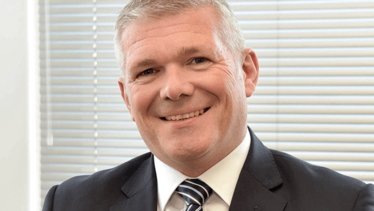Pride and Passion
Sitting Down With... Steve Turley, Managing Director for the British and Irish Isles, UCB.

What drew you to the industry?
My degree is in public policy making. My dad was a medic who was very supportive of the pharma industry – which is sadly quite rare – and he suggested that it could be a good industry to build a career in. At first glance, my degree may not seem that relevant to the pharma industry, but as managing director, knowledge of economics and government policies is incredibly beneficial to understand the complexities of healthcare systems, such as how they are funded and how priorities are set.
Why is it rare to find people who support the industry?
If you look at the purchases we make in our everyday lives, most people value the contributions of the companies at the forefront of innovation – just look at how much support a company like Apple receives from its customers, despite selling expensive products! In the pharma industry, our medicines genuinely change people’s lives, and yet our society puts so little value in the research and manufacture of those innovations. I find it a strange paradox.
We must never forget that while we are a commercial industry, we also provide real value to people’s lives. We shouldn’t shy away from the fact that we have to make profits and generate a return for stakeholders and the investment community because that is what allows us to reinvest in the medicines of the future. Having said that, the need to prove value is only going to increase. As an industry, we can’t put our heads in the sand and say that it’s not our problem. We have to make sure that the products we produce have real value for patients.
What have been your main career milestones?
Moving from a junior role into middle management was a big step for me – I moved into an international job within Roche’s global organization based in Basel. Until then, my career had been purely in the UK-based commercial side of the organization. When I moved into my new role, the drug I was focused on was coming to the end of phase III, but about six months later, the drug failed to meet the specified endpoints. It was clear that the problem was with dosing rather than efficacy so the company decided to redo the phase III program.
For me, this meant that rather than being a commercial guy coming in at the end of phase III, I was suddenly at the beginning of phase III. I had to contribute to what the phase III studies should look like; understand what the regulatory processes entailed; how we formed a brand name; how the manufacturing would work; and so on. That four-year stint gave me a huge amount of insight into the R&D, regulatory and filing process. It was fascinating.
You’ve been with UCB for a year… How are you finding the role?
It’s been great on a number of levels! UCB is a nice place to operate. It is a mid-sized company but it doesn’t feel hierarchical – the chief executive and executive board are very accessible and have a keen, day-to-day interest in the business. In addition, the patient is very much at the center of what we do. In almost any pharma company headquarters you’ll see inspiring mottos about patient value on the walls, but I think there are few companies where those words actually translate on a practical, everyday basis. All at UCB are working hard to bring those words into action.
The company operates in therapy areas that I’ve worked with in the past and that I’m very passionate about. The big learning curve has been the epilepsy side of the business, but in any new role it’s important to bring value as quickly as you can.
You are very passionate about disease-awareness campaigns…
I believe that a healthcare system needs to serve the needs of a broad range of patients. A disease like cancer, for example, receives a great deal of attention – and rightly so, because it has devastating effects on patients and those around them. However, it frustrates me that some other disease areas are relatively neglected.
It’s important that diseases such as Parkinson’s or epilepsy don’t get left behind. There is tremendous pressure on neurological services – they are already under-resourced and more resources are being taken away. Pharma companies need to work with national health agencies to ensure patients get the care they need.
What are your proudest achievements?
One of my personal values is built around the concept of pride, which is about looking back and always asking, can I take pride in what I’ve done today? Can I take pride in the fact that the decisions I made were based on the right ethics and morals? Can I take pride in the fact that I’ve supported my people – and looked after my family – as best as I can? For me, it’s not about choosing certain moments but being able to say on a daily basis: I’m proud of what I do.
Steve Turley is Managing Director for the British and Irish Isles, UCB.



















